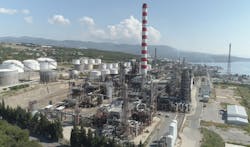Croatia’s INA lets contract for Rijeka refinery delayed coking project
Croatia’s INA Industrija Nafte DD has let a contract to Maire Tecnimont SPA subsidiary KT-Kinetics Technology SPA to provide engineering, procurement, and construction (EPC) for a new delayed coking complex at its 90,000-b/d Rijeka refinery along the northern part of the Adriatic Sea as part of an organizational strategy to boost performance and competitiveness of its Croatian refining business.
KT’s scope of work on the project will include execution of engineering and procurement of all equipment and materials, as well as construction and erection work for a new delayed coking unit with coke handling and ship loading, sour water stripper, amine recovery units, and revamping of the existing hydrocracker, sulfur recovery unit, and utilities and off site units, Maire Tecnimont said.
Alongside debottlenecking of existing units and implementation of grassroots ones, the EPC contract also covers work on coke storage and sea jetty construction at the site in a project that will involve more than 60% of the existing refinery, according to the service provider.
Maire Tecnimont, which valued the lump-sum turnkey contract at about €450 million, said it expects to complete the project in 2023.
This latest contract comes as part of INA’s long-term modernization program at the refinery, including the previously announced heavy residue upgrading plant—or delayed coking unit—which was to involve addition of a delayed coker, a coke port, storage installations, as well related pipelines and off sites (OGJ Online, Jan. 26, 2018). The residue upgrading program aims to improve the refinery’s production structure by increasing its output of more valuable products, such as motor fuels.
Earlier in December, INA announced it reached final investment decision on a more-than $600-million plan to modernize the Rijeka refinery as part of its INA Downstream 2023 New Course program, which intends to help reduce losses of the refining business by ensuring long-term sustainability and profitability of refining and marketing operations. The modernization program also involves concentration of crude processing activities at the Rijeka refinery and conversion of the company’s 44,000-b/d refinery in Sisak into a biorefining and petrochemical production site for bitumen, renewables, and potentially lubricants, as well as equipping it to perform as a modern logistics hub (OGJ Online, Dec. 13, 2019).
Conversion of the Sisak refinery into a base for bitumen production was approved earlier this year, with portions of the project for lubricant production and biorefining still subject to further investment decisions, INA said.
A specific timeframe for conversion of the Sisak refinery, however, was not disclosed.
INA is jointly owned by Hungary’s MOL Group subsidiary MOL PLC 49.1%, the Republic of Croatia 44.8%, and private and institutional investors 6.1%.
About the Author
Robert Brelsford
Downstream Editor
Robert Brelsford joined Oil & Gas Journal in October 2013 as downstream technology editor after 8 years as a crude oil price and news reporter on spot crude transactions at the US Gulf Coast, West Coast, Canadian, and Latin American markets. He holds a BA (2000) in English from Rice University and an MS (2003) in education and social policy from Northwestern University.

